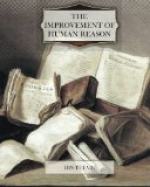To the Reverend
Mr. Edward Pococke,
Rector of
MINAL, in Wiltshire.
Reverend sir,
Hai Ebn Yokdhan returns to you again, in a Dress different from that which you sent him out in. Wherever he comes, he acknowledges you for his first and best Master; and confesses, that his being put in a Capacity to travel thro’ Europe, is owing to your Hand. I could not in Equity send him to any other Person, you being the sole Proprietor. And as your Learning enables you to do him Justice, so your Candor will incline you to pardon what is by me done amiss. Both which Qualifications you enjoy, as a Paternal Inheritance, descending from the Reverend and Learned Dr. Pococke,_ the Glory and Ornament of our Age and Nation. Whose Memory I much reverence, and how much I acknowledge my self indebted to him for his Learned Works, I thought I could no way express better, than by taking some Opportunity to pay my Respects to you, Sir, the worthy Son of so great a Father. And no fitter Bearer than_ Hai Ebn Yokdhan, with whose Character and Language you are so well acquainted, and to whom you have long ago shown so great a Respect, that I have no reason to fear but he will be welcome.
I am,
SIR,
Your most humble Servant,
Simon Ockley,
* * * * *
THE PREFACE.
When Mr. Pococke first publish’d this Arabick Author with his accurate Latin Version, Anno 1671. Dr. Pococke his Father, that late eminent Professor of the Oriental Languages in the University of Oxford, prefix’d a Preface to it; in which he tells us, that he has good Reason to think, that this Author was contemporary with Averroes, who died very ancient in the Year of the Hegira 595, which is co-incident with the 1198th Year of our Lord; according to which Account, the Author liv’d something above five hundred Years ago.
He liv’d in Spain, as appears from one or two Passages in this Book. He wrote some other Pieces, which are not come to our Hands. This has been very well receiv’d in the East; one Argument of which is, that it has been translated by R. Moses Narbonensis into Hebrew, and illustrated with a large Commentary. The Design of the Author is to shew, how Human Capacity, unassisted by any External Help, may, by due Application, attain to the Knowledge of Natural Things, and so by Degrees find out its Dependance upon a Superior Being, the Immortality of the Soul, and all things necessary to Salvation.
How well he has succeeded in this Attempt, I leave to the Reader to judge. ’Tis certain, that he was a Man of Parts and very good Learning, considering the Age he liv’d in, and the way of studying in those Times. There are a great many lively Stroaks in it; and I doubt not but a judicious Reader will find his Account in the Perusal of it.




